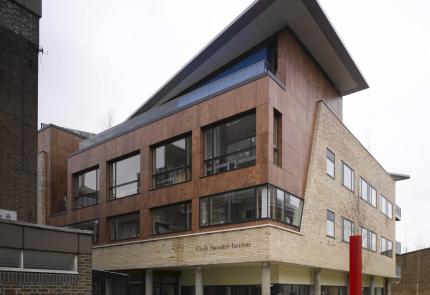In February, at one of the last physical events held at the Institute before the onset of the current crisis, more than 200 professionals gathered from across the UK to learn how patient outcome measures and data can be used to improve palliative care – a long-term project of the theme.
One attendee at the event, Dr Margaret Elliott from St Elizabeth Hospice in Ipswich, described the value to the hospice of patient-reported outcome measures, developed by the Institute’s researchers. “The good thing about the Integrated Palliative Outcome Scale is that it enables us to collect data more formally and rigorously. The changes we’ve implemented as a result are not expensive or high-tech. In fact, we’ve gone back to basics by being less reliant on drugs and spending more time with patients helping them with their breathing techniques. Another benefit has been that staff morale has been boosted. Staff feel very empowered as they can see that their work is making a difference.” (Read the full interview with Dr Elliott.)
Responding rapidly to support the Covid-19 effort
In the weeks since that event, palliative care services across the country have been placed under severe pressure. “With more than 65,000 excess deaths, and many more people severely ill, palliative care has been stretched and has needed to respond in ways I have never seen," says Professor Higginson. "South London has been particularly badly affected. Although these are awful times, and several colleagues have been ill, palliative care is also changing fast in numerous ways.”
The ARC’s research team at the Cicely Saunders Institute responded rapidly to support the local, national and international Covid-19 effort. They realised that with the government’s focus on protecting the NHS and ensuring adequate intensive care capacity, there was a risk that palliative care services would be overlooked. They also recognised that with many people living with chronic long-term conditions shielding at home, unable to access their usual support services, there was a challenge around self-managing care at home.
In response, the team has published several rapid Covid-19 research studies, and launched new research, including a study to understand how palliative services have responded to Covid-19. They have also produced rapid new clinical resources, including recommendations for hospital clinicians to support relatives with bereavement, and guidance for patients and respiratory professionals on treatments and support for those with Covid-19, translated into 15 languages. Connected to this work, they have produced a practical guide to help people experiencing breathlessness who are unable to access secondary care, to manage their symptoms at home. This resource has been shared widely across the UK, Canada and the USA.
In addition, the team has reached out to patients, carers, family and the public to understand their experiences and to identify research priorities. In this respect, the theme’s online public forum for palliative research – the first of its kind in the UK – has been an invaluable tool in the crisis. They have also co-hosted a virtual meeting with ARC East of England as part of their NIHR joint national leadership for palliative and end of life care, bringing together clinicians and researchers from across the UK to discuss the situation.
The future of palliative and end of life care
The disproportionate impact of Covid-19 on older people, those with underlying health conditions, such as diabetes, and on people from black, Asian and minority ethnic groups has highlighted the priorities that drive the ARC South London’s applied research. These include the need to improve care for vulnerable and older populations, to support people living with multiple health conditions, and to address inequalities in health and social care.
Thinking about the future of palliative care, Professor Higginson says: “We have ageing populations, living with multiple chronic conditions. In the long term, we're going to see a big increase in the number of deaths, and we know that we don’t have enough service capacity currently. There's a big question about how we respond to this.” One approach could be greater integration with social care services, an area the theme is investigating.
In relation to the more immediate challenges from Covid-19, Professor Higginson says: “It is very clear that we need a more concerted effort to gather more data in real time, to inform the response now and in the future. This is a new disease, and we know so little about it. Current guidance is using the best evidence from a different situation. This is urgent. The number of people who have been severely ill has been very high, and although the situation in hospitals and care homes is easing now, this disease will be with us for some time.”
Find out more:

